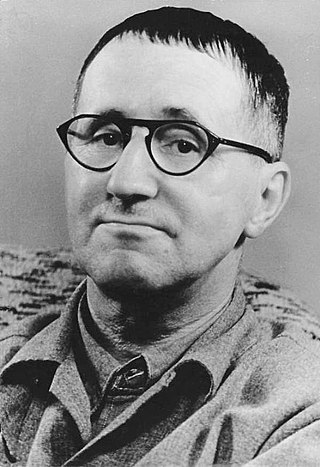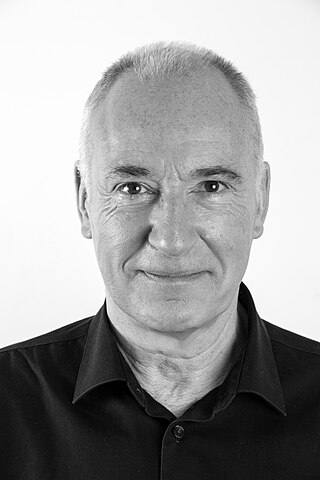
Kurt Julian Weill was a German-born American composer active from the 1920s in his native country, and in his later years in the United States. He was a leading composer for the stage who was best known for his fruitful collaborations with Bertolt Brecht. With Brecht, he developed productions such as his best-known work, The Threepenny Opera, which included the ballad "Mack the Knife". Weill held the ideal of writing music that served a socially useful purpose, Gebrauchsmusik. He also wrote several works for the concert hall and a number of works on Jewish themes. He became a United States citizen in 1943.
Dramaturgy is the study of dramatic composition and the representation of the main elements of drama on the stage.

Eric Russell Bentley was a British-born American theater critic, playwright, singer, editor, and translator. In 1998, he was inducted into the American Theatre Hall of Fame. He was also a member of the New York Theater Hall of Fame, recognizing his many years of cabaret performances.

Organic Theater Company was founded in 1969 in Madison, Wisconsin by artistic director Stuart Gordon and his wife Carolyn Purdy Gordon.

Theatre Intime is an entirely student-run dramatic arts not-for-profit organization operating out of the Hamilton Murray Theater at Princeton University. Intime receives no direct support from the university, and is entirely acted, produced, directed, teched and managed by a board of students that is elected once a semester. "Students manage every aspect of Theatre Intime, from choosing the plays to setting the ticket prices."

Peter Stein is a German theatre and opera director who established himself at the Schaubühne am Lehniner Platz, a company that he brought to the forefront of German theatre.
David Esbjornson is a director and producer who has worked throughout the United States in regional theatres and on Broadway, and has established strong and productive relationships with some of the profession's top playwrights, actors, and companies. Esbjornson was the artistic director of Seattle Repertory Theatre in Seattle, Washington, but left that position in summer 2008.

María Irene Fornés was a Cuban-American playwright, theater director, and teacher who worked in off-Broadway and experimental theater venues in the last four decades of the twentieth century. Her plays range widely in subject matter, but often depict characters with aspirations that belie their disadvantages. Fornés, who went by the name "Irene", received nine Obie Theatre Awards in various categories and was a finalist for the Pulitzer Prize in Drama for 1990.
Matthew Earnest is an American theater director. He has also written plays, as well as adapted plays from novels, non-fiction books, short stories, and essays, and he has translated works in other languages for his direction.
"A Short Organum for the Theatre" is a theoretical work by the twentieth-century German theatre practitioner Bertolt Brecht. It was written while in Switzerland in 1948 and published in 1949. In a diary note from the time he refers to it as a "short condensation of the 'Messingkauf'"; when it was re-published in 1953 he identified it as a "description of a theatre of the scientific age"; later still he augmented it with some appendices and linked it to his notes for a "dialectical theatre".
Round Heads and Pointed Heads is an epic parable play written by the German dramatist Bertolt Brecht, in collaboration with Margarete Steffin, Emil Burri, Elisabeth Hauptmann, and the composer Hanns Eisler. The play's subtitle is Money Calls to Money and its authors describe it as "a tale of horror." The play is a satirical anti-Nazi parable about a fictitious country called Yahoo in which the rulers maintain their control by setting the people with round heads against those with pointed heads, thereby substituting racial relations for their antagonistic class relations. The play is composed of 11 scenes in prose and blank verse and 13 songs. Unlike another of Brecht's plays from this period, The Mother, Round Heads and Pointed Heads was addressed to a wide audience, Brecht suggested, and took account of "purely entertainment considerations." Brecht's notes on the play, written in 1936, contain the earliest theoretical application of his "defamiliarization" principle to his own "non-Aristotelian" drama.
The Guthrie Theater is a center for theater performance, production, education, and professional training in Minneapolis, Minnesota. The following is a chronological list of the plays and performances that it has produced or presented. Production information from 1963 through the 2005–06 season is sourced primarily from The Guthrie Theater: Images, History, and Inside Stories and The Guthrie Theater.
Fucking A is a play written by American playwright Suzan-Lori Parks. It was produced by DiverseWorks and Infernal Bridegroom Productions and premiered in Houston, Texas on February 24, 2000.
The Open Fist Theatre is both a 501(c)(3) non-profit theatre company. Originally operating a 99-seat theatre facility in Theatre Row Hollywood located at 6209 Santa Monica Blvd, it is now in residence at the Atwater Village Theatre. The name of the Open Fist Theatre Company comes from two principles: the notion of an open spirit and the fist - a sign of determination and force.

Eugen Berthold Friedrich Brecht, known as Bertolt Brecht and Bert Brecht, was a German theatre practitioner, playwright, and poet. Coming of age during the Weimar Republic, he had his first successes as a playwright in Munich and moved to Berlin in 1924, where he wrote The Threepenny Opera with Elisabeth Hauptmann and Kurt Weill and began a life-long collaboration with the composer Hanns Eisler. Immersed in Marxist thought during this period, Brecht wrote didactic Lehrstücke and became a leading theoretician of epic theatre and the Verfremdungseffekt.
Tamarie Cooper is an actress and playwright in Houston, Texas who is best known for her work with Infernal Bridegroom Productions and the Catastrophic Theatre. She currently serves as artistic director of the Catastrophic Theatre. She attended Houston's High School for the Performing and Visual Arts.
César Alvarez is an American composer, lyricist and playwright. César is best known for the musical FUTURITY which they wrote with their band The Lisps. FUTURITY won the Lucille Lortel Award for Outstanding Musical in 2016.

The Firehouse Theater of Minneapolis and later of San Francisco was a significant producer of experimental, theater of the absurd, and avant guard theater in the 1960s and 1970s. Its productions included new plays and world premieres, often presented with radical or inventive directorial styles. The Firehouse introduced playwrights and new plays to Minneapolis and San Francisco. It premiered plays by Megan Terry, Sam Shepard, Jean-Claude van Itallie, María Irene Fornés and others; and it presented plays by Harold Pinter, John Arden, August Strindberg, John Osborne, Arthur Kopit, Eugène Ionesco, Berthold Brecht, Samuel Beckett and others. In a 1987 interview Martha Boesing, the artistic director of another Minneapolis theatre, described the Firehouse Theater as "the most extreme of all the groups creating experimental theater in the sixties, and the closest to Artaud’s vision." Writing in 1968, The New York Times said that the Firehouse Theater "has been doing avantgarde plays in Minneapolis nearly as long as the Tyrone Guthrie Theater has been doing the other kind, and with much less help from the Establishment." That same year, when a federal grant was provided to support the Firehouse, it was pointed out in the Congressional Record that the Firehouse Theatre "is the only major theatre dealing experimentally with the writing of plays and their production outside the metropolitan New York area."

Martin David Anson Duncan is an English director, actor, composer, and choreographer. Duncan was artistic director of Nottingham Playhouse from 1994 to 1999 and joint artistic director of Chichester Festival Theatre from 2003 to 2005 with Ruth Mackenzie and Steven Pimlott. He has composed the musical scores for over 50 theatre productions.








